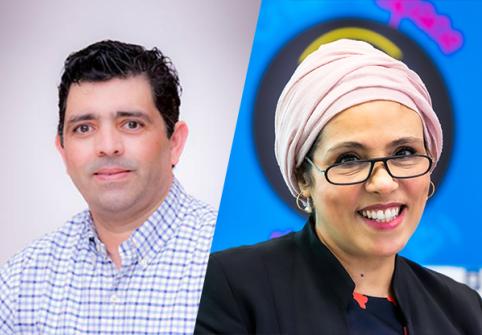Excellence HBKU’s Qatar Biomedical Research Institute Shares Expertise Through Webinar Series
Local and international guest speakers engage research community in thought-provoking discussions on a range of pertinent topics
Renowned local and international academics and researchers are leading a series of webinars hosted by Qatar Biomedical Research Institute (QBRI), part of Hamad Bin Khalifa University (HBKU), to engage the research community on topics relating to COVID-19 and other important subjects.
The QBRI Talks: Guide for Early-Career STEM Researchers webinar series is designed for Early Career Researchers (ECR). The series features inspiring talks from pioneers about their personal journey in a scientific career, with the aim of sparking conversation among young minds to actively pursue personal and professional development.
Dr. Richard O’Kennedy, Vice-President of Research at HBKU and Vice-President of Research, Development and Innovation at Qatar Foundation, led the first webinar on ‘Developing a Plan for Scientific Career Development’. During the discussion, Dr. O’Kennedy offered advice to students on how to develop career strategies in today’s uncertain and highly competitive world, particularly during the global pandemic caused by the COVID-19.
The second webinar in the QBRI Talks: Guide for Early-Career STEM Researchers series, to be held on July 22, will see Dr. Nasser H. Zawia, professor and former Dean of the Graduate School at the University of Rhode Island, discuss the basic elements of grant proposal writing based on the National Institutes of Health (NIH) format.
Commenting on the webinars, Dr. Omar El Agnaf, Executive Director, QBRI, said: “It’s been important for us to keep momentum going as we navigate the global pandemic. These webinars have created a new channel for QBRI to stimulate thought provoking and insightful discussions on a range of prominent topics. The series also strengthens ties and opens communication between QBRI and other institutions across the globe.”
Running in parallel with the career development series, QBRI is also hosting a webinar series dedicated to highlighting various topics of current global significance. Dr. Swaine Chen, Associate Professor of Medicine at the National University of Singapore, and a group leader at the Genome Institute of Singapore, led the first webinar in the series, which focused on ‘Definitive Elucidation of Virulence Mechanisms: New Experimental and Computational Approaches’. Dr. Chen’s research interests include trying to understand how some bacteria are proficient at causing infections in humans. His pioneering work on the subject contributed to the discovery of a previously unknown foodborne illness caused by Group B Streptococcus in Singapore and South East Asia.
The second event in this series, held on July 15, was led by Dr. Ali H. Mokdad, Professor, Institute for Health Metrics and Evaluation (IHME), and Chief Strategy Officer for Population Health, University of Washington. Dr. Mokdad explored ‘IHME Projections for Qatar: Strategies to Reduce the Spread of COVID-19’.
QBRI will continue to host informational webinars that raise awareness about several topics and enhance interaction between local, regional and international researchers
QBRI is home to three research centers – Cancer Research Center, Neurological Disorders Research Center, and the Diabetes Research Center. For more information about QBRI and its research centers, please visit qbri.hbku.edu.qa




